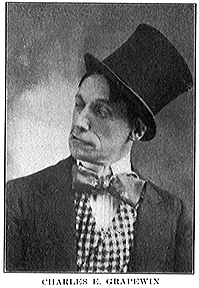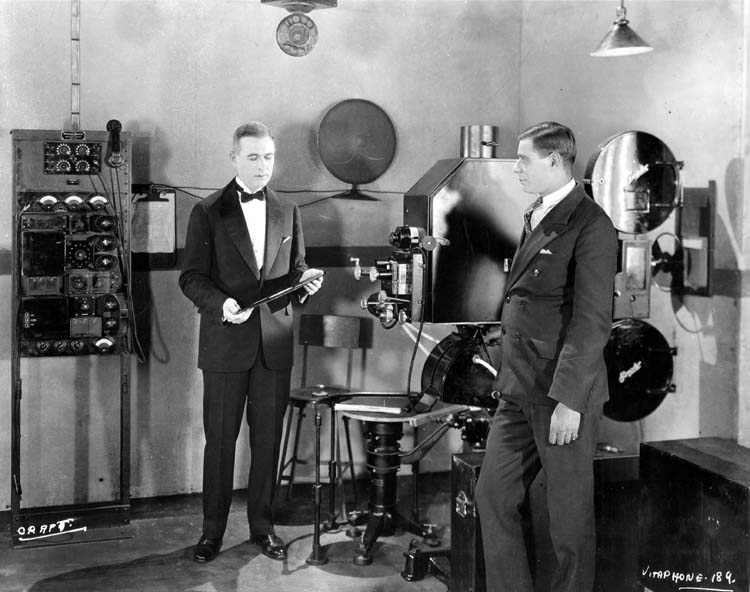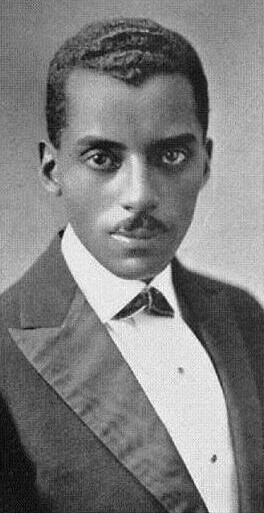|
Aubrey Lyles
Aubrey Lee Lyles (8 January 1884 – 28 July 1932), sometimes credited as A. L. Lyles, was an American vaudeville performer, playwright, songwriter, and lyricist. He appeared with Flournoy E. Miller as Miller and Lyles as a popular African-American comedy duo from 1905 until shortly before his death. in 1929 they appeared on film as grocers in the Vitaphone Varieties short comedy film '' They Know Their Groceries''. Biography Lyles was born in Jackson, Tennessee, and attended Fisk University in Nashville as a medical student. He began performing as one half of a comedy duo, Miller and Lyles, with his friend Flournoy Miller. From 1905, Miller and Lyles were hired by impresario Robert T. Motts to be resident playwrights with the Pekin Theater Stock Company in Chicago. They performed with the company in blackface, and in the show '' The Colored Aristocrats'' introduced the characters Steve Jenkins (Miller) and Sam Peck (Lyles), with which they would be associated for many y ... [...More Info...] [...Related Items...] OR: [Wikipedia] [Google] [Baidu] |
Vaudeville
Vaudeville (; ) is a theatrical genre of variety entertainment which began in France in the middle of the 19th century. A ''vaudeville'' was originally a comedy without psychological or moral intentions, based on a comical situation: a dramatic composition or light poetry, interspersed with songs and dances. Vaudeville became popular in the United States and Canada from the early 1880s until the early 1930s, while changing over time. In some ways analogous to music hall from Victorian Britain, a typical North American vaudeville performance was made up of a series of separate, unrelated acts grouped together on a common bill. Types of acts have included popular and classical musicians, singers, dancers, comedians, trained animals, magicians, ventriloquists, strongmen, female and male impersonators, acrobats, clowns, illustrated songs, jugglers, one-act plays or scenes from plays, athletes, lecturing celebrities, minstrels, and films. A vaudeville performer ... [...More Info...] [...Related Items...] OR: [Wikipedia] [Google] [Baidu] |
James Reese Europe
James Reese Europe (February 22, 1880 – May 9, 1919) was an American ragtime and early jazz bandleader, arranger, and composer. He was the leading figure on the African-American music scene of New York City in the 1910s. Eubie Blake called him the " Martin Luther King of music". Early life Europe was born in Mobile, Alabama, to Henry Jefferson Europe (1848–1899) and Loraine Saxon ''(maiden;'' 1849–1930). His family – which included four siblings, Minnie Europe (Mrs. George Mayfield; 1868–1931), Ida S. Europe (1870–1919), John Newton Europe (1875–1932), and Mary Loraine (1883–1947) – moved to Washington, D.C., when he was 10 years old.Lefferts, Peter M"Chronology and Itinerary of the Career of James Reese Europe: Materials for a Biography" University of Nebraska–Lincoln, School of Music, July 29, 2016."New York, New York City Marriage Records, 1829–1940", FamilySearch (database), February 10, 2018, New York City Municipal Archives; FHL microfilm 1,614,0 ... [...More Info...] [...Related Items...] OR: [Wikipedia] [Google] [Baidu] |
James P
James may refer to: People * James (given name) * James (surname) * James (musician), aka Faruq Mahfuz Anam James, (born 1964), Bollywood musician * James, brother of Jesus * King James (other), various kings named James * Prince James (other) * Saint James (other) Places Canada * James Bay, a large body of water * James, Ontario United Kingdom * James College, York, James College, a college of the University of York United States * James, Georgia, an unincorporated community * James, Iowa, an unincorporated community * James City, North Carolina * James City County, Virginia ** James City (Virginia Company) ** James City Shire * James City, Pennsylvania * St. James City, Florida Film and television * James (2005 film), ''James'' (2005 film), a Bollywood film * James (2008 film), ''James'' (2008 film), an Irish short film * James (2022 film), ''James'' (2022 film), an Indian Kannada-language film * "James", a television Adventure Time (season 5)#ep42, ... [...More Info...] [...Related Items...] OR: [Wikipedia] [Google] [Baidu] |
Charleston (dance)
The Charleston is a dance named after the harbor city of Charleston, South Carolina. The rhythm was popularized in mainstream dance music in the United States by a 1923 tune called "Charleston (1923 song), The Charleston" by composer/pianist James P. Johnson, which originated in the Broadway theatre, Broadway show ''Runnin' Wild (Musical), Runnin' Wild'' and became one of the most popular hits of the decade. ''Runnin' Wild'' ran from 28 October 1923 through 28 June 1924. The Charleston dance's peak popularity occurred from mid-1926 to 1927. Origins While the dance probably came from the "star" or challenge dances that were all part of the African-American dance called juba dance, Juba, the particular sequence of steps which appeared in ''Runnin' Wild'' were probably newly devised for popular appeal. "At first, the step started off with a simple twisting of the feet, to rhythm in a lazy sort of way. When the dance hit Harlem, a new version was added. It became a fast kicking ... [...More Info...] [...Related Items...] OR: [Wikipedia] [Google] [Baidu] |
Okeh Records
OKeh Records () is an American record label founded by the Otto Heinemann Phonograph Corporation, a phonograph supplier established in 1916, which branched out into phonograph records in 1918. The name originally was spelled "OkeH" from the initials of Otto K. E. Heinemann but was later changed to "OKeh". In 1965, OKeh became a subsidiary of Epic Records, a subsidiary of Sony Music. OKeh has since become a jazz imprint, distributed by Sony Masterworks. Early history OKeh was founded by Otto (Jehuda) Karl Erich Heinemann (Lüneburg, Germany, 20 December 1876 – New York, USA, 13 September 1965) a German-American manager for the U.S. branch of Odeon Records, which was owned by Carl Lindstrom. In 1916, Heinemann incorporated the Otto Heinemann Phonograph Corporation, set up a recording studio and pressing plant in New York City, and started the label in 1918. The first discs were vertical cut, but later the more common lateral-cut method was used. The label's parent company ... [...More Info...] [...Related Items...] OR: [Wikipedia] [Google] [Baidu] |
Sound-on-disc
Sound-on-disc is a class of sound film processes using a phonograph or other disc to record or play back sound in sync with a motion picture. Early sound-on-disc systems used a mechanical interlock with the movie projector, while more recent systems use timecodes. Examples of sound-on-disc processes France * The Chronophone ( Léon Gaumont) "Filmparlants" and phonoscènes 1902–1910 (experimental), 1910–1917 (industrial)Thomas Louis Jacques Schmitt, « The genealogy of clip culture » in Henry Keazor, Thorsten Wübbena (dir.) ''Rewind, Play, Fast Forward'', transcript, United States * Vitaphone introduced by Warner Bros. in 1926 * Photokinema, short-lived system, invented by Orlando Kellum in 1921 (used by D. W. Griffith for '' Dream Street'') * Digital Theater Systems United Kingdom * British Phototone, short-lived UK system using 12-inch discs, introduced in 1928-29 ('' Clue of the New Pin'') Other * Systems with the film projector linked to a phonograph or cylinde ... [...More Info...] [...Related Items...] OR: [Wikipedia] [Google] [Baidu] |
Photokinema
''Photo-Kinema'' (some sources say ''Phono-Kinema'') was a sound-on-disc system for motion pictures invented by Orlando Kellum. 1921 introduction The system was first used for a small number of short films, mostly made in 1921. These films presented subjects such as actor Frederick Warde reading an original poem "A Sunset Reverie", labor leader Samuel Gompers speaking on labor issues, Judge Ben Lindsey on the need for a separate juvenile court system, Irvin S. Cobb reading from his works, and a lecture by James J. Davis, Secretary of Labor in the Harding administration. Kellum also filmed musical numbers, including a performance of the song "De Ducks" by African American musicians F. E. Miller and Aubrey Lyles who wrote the book for the musical '' Shuffle Along'' (1921), and ''The Famous Van Eps Trio in a Bit of Jazz'' (1921), featuring Fred Van Eps, father of musician George Van Eps. A filmed performance by Sir Harry Lauder made in Phono-Kinema is preserved at the U ... [...More Info...] [...Related Items...] OR: [Wikipedia] [Google] [Baidu] |
Short Film
A short film is a film with a low running time. The Academy of Motion Picture Arts and Sciences (AMPAS) defines a short film as "an original motion picture that has a running time of not more than 40 minutes including all credits". Other film organizations may use different definitions, however; the Academy of Canadian Cinema and Television, for example, currently defines a short film as 45 minutes or less in the case of documentaries, and 59 minutes or less in the case of scripted narrative films (it is not made clear whether this includes closing credits). In the United States, short films were generally termed short subjects from the 1920s into the 1970s when confined to two 35 mm reels or less, and featurettes for a film of three or four reels. "Short" was an abbreviation for either term. The increasingly rare industry term "short subject" carries more of an assumption that the film is shown as part of a presentation along with a feature film. Short films are often s ... [...More Info...] [...Related Items...] OR: [Wikipedia] [Google] [Baidu] |
I'm Just Wild About Harry
"I'm Just Wild About Harry" is a song written in 1921 with lyrics by Noble Sissle and music by Eubie Blake for the Broadway show '' Shuffle Along''. "I'm Just Wild About Harry" was the most popular number of the production, which was the first financially successful Broadway play to have African-American writers and an all African-American cast. The song broke what had been a taboo against musical and stage depictions of romantic love between African-Americans. Originally written as a waltz, Blake rewrote the number as a foxtrot at the singer's request. The result was a simple, direct, joyous, and infectious tune enhanced onstage by improvisational dancing. In 1948, Harry S Truman selected "I'm Just Wild About Harry" as his campaign song for the United States presidential election of 1948. Its success in politics led to a popular revival. Background Both "I'm Just Wild About Harry" and the show ''Shuffle Along'' broke racial taboos. During the early 20th century African-America ... [...More Info...] [...Related Items...] OR: [Wikipedia] [Google] [Baidu] |
Noble Sissle
Noble Lee Sissle (July 10, 1889 – December 17, 1975) was an American jazz composer, lyricist, bandleader, singer, and playwright, best known for the Broadway musical ''Shuffle Along'' (1921), and its hit song "I'm Just Wild About Harry". Early life Sissle was born in Indianapolis, Indiana, United States, around the time his father Rev. George A. Sissle was pastor of the city's Simpson M. E. Chapel.Reef (2010) His mother, Martha Angeline (née Scott) Sissle, was a school teacher and juvenile probation officer. As a youth, Sissle sang in church choirs and as a soloist with his high school's glee club in Cleveland, Ohio. Sissle attended De Pauw University in Greencastle, Indiana on scholarship and later transferred to Butler University in Indianapolis before turning to music full-time. Career In early 1916, Sissle joined one of the society orchestras organized by James Reese Europe in New York. He persuaded Europe to also hire his friend, pianist and composer Eubie Blake, an ... [...More Info...] [...Related Items...] OR: [Wikipedia] [Google] [Baidu] |
Eubie Blake
James Hubert "Eubie" Blake (February 7, 1887 – February 12, 1983) was an American pianist and composer of ragtime, jazz, and popular music. Blake began his career in 1912, and during World War I he worked in partnership with the singer, drummer, and comedian Broadway Jones. After the war he began a collaboration with Noble Sissle with whom he wrote '' Shuffle Along'' (1921), one of the first Broadway musicals written and directed by African Americans. When his collaboration with Sissle ended in 1927, he resumed a partnership with Jones which lasted until either 1932 or 1933. He reunited with Sissle briefly for ''Shuffle Along of 1933'', and later the pair worked together in the United Service Organizations during World War II. Blake's compositions included such hits as "Bandana Days", "Charleston Rag", "Love Will Find a Way", " Memories of You" and " I'm Just Wild About Harry". The 1978 Broadway musical '' Eubie!'' showcased his works, and in 1981, President Ronald Reagan awa ... [...More Info...] [...Related Items...] OR: [Wikipedia] [Google] [Baidu] |
Musical Theater
Musical theatre is a form of theatrical performance that combines songs, spoken dialogue, acting and dance. The story and emotional content of a musical – humor, pathos, love, anger – are communicated through words, music, movement and technical aspects of the entertainment as an integrated whole. Although musical theatre overlaps with other theatrical forms like opera and dance, it may be distinguished by the equal importance given to the music as compared with the dialogue, movement and other elements. Since the early 20th century, musical theatre stage works have generally been called, simply, musicals. Although music has been a part of dramatic presentations since ancient times, modern Western musical theatre emerged during the 19th century, with many structural elements established by the light opera works of Jacques Offenbach in France, Gilbert and Sullivan in Britain and the works of Harrigan and Hart in America. These were followed by Edwardian musica ... [...More Info...] [...Related Items...] OR: [Wikipedia] [Google] [Baidu] |








